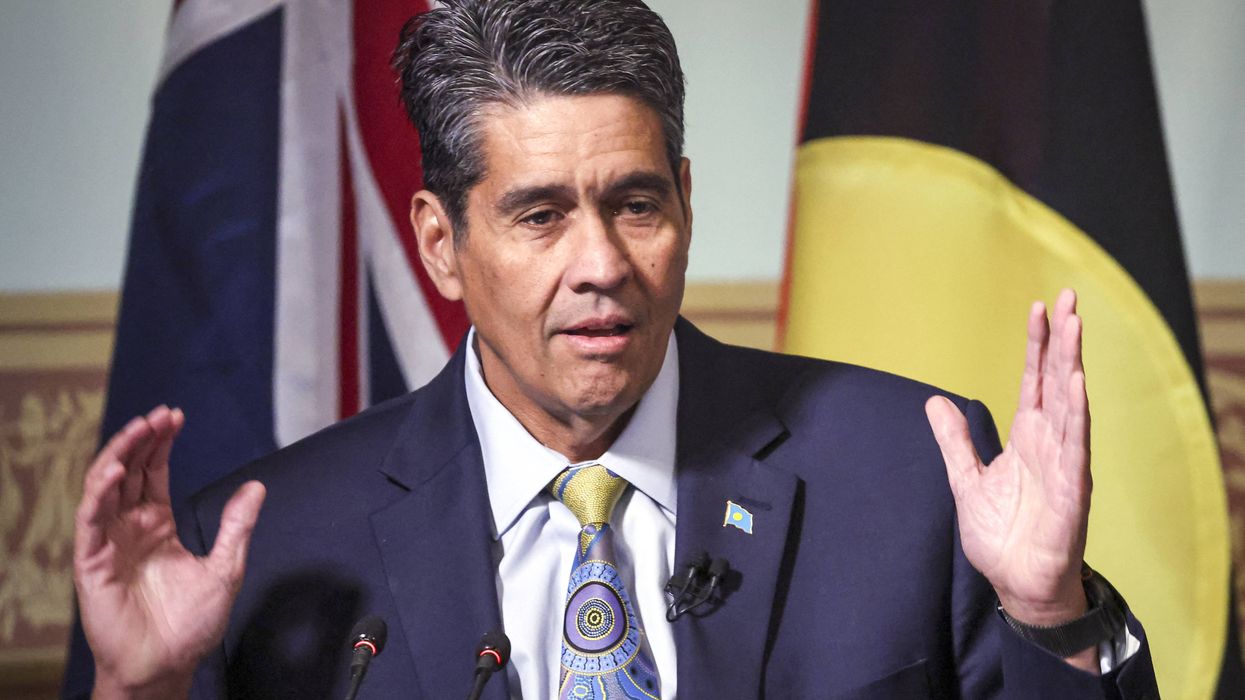October, 18 2022, 11:40am EDT

Experts Agree: Fed Should Think Twice Before Raising Interest Rates Again
Ahead of next week's Federal Open Market Committee meeting, a growing chorus of experts is raising questions about the Federal Reserve's sledgehammer approach to reining in inflation. Here's what they are saying:
Adam Tooze | European Institute at Columbia University:
WASHINGTON
Ahead of next week's Federal Open Market Committee meeting, a growing chorus of experts is raising questions about the Federal Reserve's sledgehammer approach to reining in inflation. Here's what they are saying:
Adam Tooze | European Institute at Columbia University:
"Raising interest rates is not going to bring more gas or microchips to market, but rather the contrary. Reducing investment will limit future capacity and thus future supply...If the generation of young people whose educations were blighted by Covid lockdowns finish their training only to find labor markets closed by a global downturn, it will be an inexcusable failure of policy." [10/4/22]
Ayhan Kose | World Bank:
"As central banks across the world simultaneously hike interest rates in response to inflation, the world may be edging toward a global recession in 2023 and a string of financial crises in emerging markets and developing economies that would do them lasting harm." [9/15/22]
Barry Sternlicht | Starwood Capital Group:
"If the Fed keeps this up they are going to have a serious recession and people will lose their jobs" [9/15/22]
Brian Sack | D.E. Shaw, former Federal Reserve Bank of New York official:
"Moving in these 75-basis-point steps was effective when the Fed had a long way to go. It becomes more problematic when they need to calibrate policy more carefully, and I believe we're approaching that point." [10/8/22]
Cathie Wood | Ark Invest:
"Without question, food and energy prices are important, but we do not believe that the Fed should be fighting and exacerbating the global pain associated with a supply shock to agriculture and energy commodities caused by Russia's invasion of Ukraine."
"The Fed seems focused on two variables that, in our view, are lagging indicators--downstream inflation and employment--both of which have been sending conflicting signals and should be calling into question the Fed's unanimous call for higher interest rates." [10/10/22]
David Kelly | J.P. Morgan Asset Management:
"In the long history of Federal Reserve mistakes, one general error stands out. They tend to wait too long and then do too much... They appear to be well on their way to repeating this error today." [10/12/22]
"The Fed is in grave danger of tipping this economy into a recession by being more hawkish than they need to be right now." [9/12/22]
Greg Mankiw | Harvard University, former George W. Bush Administration official:
"...it's easy for a novice to overreact, and then if you turn too much in the other direction, it can be a source of instability rather than stability." [10/11/22]
Jeremy Siegel | Wharton School of Business:
"(Powell) is going to crush the wages, which have fallen behind inflation...you can't blame wages for inflation when they are two, three, five points behind inflation...I think the Fed is just way too tight." [9/24/22]
Joseph Stiglitz | Nobel Prize-winning economist:
"Will raising interest rates lead to more oil, lower prices of oil, more food, lower prices of food? Answer is clearly not. In fact, the real risk is it will make it worse... Why? Because what we need to do is to make investments to relieve some of these supply-side bottlenecks that are causing such havoc on our economy. It's going to make it more difficult." and "...raising interest rates in non-competitive markets may lead to even more inflation..." [9/2/22]
Katie Nixon | Northern Trust Wealth Management:
"So I'm not as nervous about a deep recession, but I do think that this latest dot plot and the summary of economic projections points to a Fed going a lot further than, perhaps, they need to go, given the inflation outlook, and that they are doing so at a time when the economy is quite vulnerable to a slowdown. It's not just the US economy, it's the global economy and this might be a bridge too far." [9/12/22]
Kurt Rankin | PNC:
"Unfortunately, wage growth in the U.S. economy has already begun to fizzle while inflation has remained stubbornly high. The Fed's 'demand destruction aims will only serve to weaken workers' bargaining positions in the labor market as consumer demand is undercut and businesses see less need to hire in response to slowing demand for their goods and services." [10/14/22]
Liz Shuler | AFL-CIO:
"There are some bad ideas floating around out there (to bring down inflation) like the idea that working people, who have kept the country running are to blame for inflation."
"Nothing could be further from the truth." [9/21/22]
Michael Darda | MKM Partners:
"I think households here are also caught in the Fed's crosshairs because the tightening is likely to keep going until it kills the labor market...They [the Fed] will kill inflation, but they are going to end up killing the labor market." [10/14/22]
Pierre-Olivier Gourinchas | International Monetary Fund:
"Monetary policy could miscalculate the right stance to reduce inflation. Policy paths in the largest economies could continue to diverge, leading to further US dollar appreciation and cross-border tensions. More energy and food price shocks might cause inflation to persist for longer. Global tightening in financing conditions could trigger widespread emerging market debt distress." [10/11/22]
Rebeca Grynspan | United Nations Conference on Trade and Development:
"The current course of action is hurting vulnerable people everywhere, especially in developing countries. We must change course."
"If you want to use only one instrument to bring inflation down...the only possibility is to bring the world to a slowdown that will end up in a recession." [10/3/22]
Email press@groundworkcollaborative.org to speak to Dr. Rakeen Mabud about the Fed's interest rate hikes and what they spell for our economy.
The Groundwork Collaborative is dedicated to advancing a coherent and persuasive progressive economic worldview and narrative capable of delivering meaningful opportunity and prosperity for everyone. Our work is driven by a core guiding principle: We are the economy. Groundwork Collaborative envisions an economic system that produces strong, broadly shared prosperity and power for all people, not just a wealthy few.
LATEST NEWS
'Unhinged' Trump Wishes 'Merry Christmas to All, Including the Radical Left Scum'
"Nothing more Christian than to be a hateful wretched fuck on Jesus’ birthday," quipped one critic.
Dec 25, 2025
In a message called typically on-brand by observers, US President Donald Trump wished "Merry Christmas to all"—including his political opponents, whom he described in decidedly unchristlike language.
"Merry Christmas to all, including the Radical Left Scum that is doing everything possible to destroy our Country, but are failing badly," Trump said Christmas Eve on his Truth Social network.
"We no longer have Open Borders, Men in Women’s Sports, Transgender for Everyone, or Weak Law Enforcement," the president added. "What we do have is a Record Stock Market and 401K’s, Lowest Crime numbers in decades, No Inflation, and yesterday, a 4.3 GDP, two points better than expected. Tariffs have given us Trillions of Dollars in Growth and Prosperity, and the strongest National Security we have ever had. We are respected again, perhaps like never before. God Bless America!!!"
While nothing new—Trump has used past Christmas messages to tell people he doesn't like to "go to hell" and "rot in hell"—observers, including some MAGA supporters, were still left shaking their heads.
"Radical Left Scum" 😂🤣😂🤣😂🤣Christmas greetings from a liar, traitor, pedophile, and overall shitstain upon society.
[image or embed]
— Bill Madden (@maddenifico.bsky.social) December 24, 2025 at 9:00 PM
"Nothing more Christian than to be a hateful wretched fuck on Jesus’ birthday!" liberal political commentator Dean Withers said on X.
Another popular X account posted: "A sitting president of the United States using Christmas Day to spew venom at fellow Americans he calls 'Radical Left Scum' isn’t just unpresidential—it’s unhinged, un-Christian, and utterly beneath the office."
"This is the behavior of a bitter, small man who can’t even pretend to unify for one holy day," she added. "Shameful. Disgraceful. Pathetic."
Keep ReadingShow Less
Palau Signs Controversial $7.5 Million Deal to Take 75 Trump Deportees
"What if we spent the $100,000 per person in America setting them up with housing assistance, healthcare, education, etc?" asked one critic.
Dec 25, 2025
Palau said Wednesday that it has agreed to take in up to 75 people deported from the United States during President Donald Trump's purge of unauthorized immigrants in exchange for millions of dollars in financial assistance—a move that has sparked considerable opposition among the Pacific archipelago nation's roughly 18,000 inhabitants.
The office of Palauan President Surangel Whipps Jr. announced a memorandum of understanding with the United States under which the country will receive $7.5 million in assistance in exchange for taking in 75 third-country deportees who cannot be repatriated to their countries of origin.
Earlier this week, US State Department Principal Deputy Spokesperson Tommy Pigott said the people who will be sent to Palau have “no known criminal histories," as is the case with the vast majority of unauthorized immigrants in the United States, who have committed no crime other than the mere misdemeanor of entering the country illegally.
However, Palauans have voiced concerns over US Secretary of State Marco Rubio's remarks during a Cabinet meeting earlier this year in which he said that, “We want to send some of the most despicable human beings—perverts, pedophiles, and child rapists—to your countries as a favor to us."
Whipps said Wednesday that the relocation plan involves “people seeking safety and stability."
“These are not criminals,” the president said during earlier debate on the proposal. “Their only offense was entering the United States illegally and working without proper permits.”
However, Palau's Congress and its influential Council of Chiefs have twice rejected the transfers.
Piggot's statement "highlighted US commitments to partner with Palau on strengthening the country’s healthcare infrastructure, increasing Palau’s capacity to combat transnational crime and drug trafficking, and bolstering Palau’s civil service pension system."
Palau, which was administered by the US from 1947-94 and is now associated with the United States under the 1994 Compact of Free Association, which guaranteed the country nearly $900 million economic aid over 20 years in exchange for exclusive US military access.
The country's foreign policy often tracks closely to that of the US. For example, Palau is sometimes among the handful of usually similarly small nations that vote along with the United States and Israel against United Nations resolutions condemning Israeli crimes or affirming Palestinian rights.
Other developing nations including Eswatini, Rwanda, South Sudan, and Uganda have also agreed to take in US deportees or are considering doing so.
Reactions to the US-Palau agreement drew criticism on social media, where one X user called the deal a "bribe" and another popular Bluesky account asked, "What if we spent the $100,000 per person in America setting them up with housing assistance, healthcare, education, etc?"
Keep ReadingShow Less
Trump 'Choosing From the War Crimes Menu' With 'Quarantine' on Venezuela Oil Exports
"Economic strangulation is warfare and civilians always pay the price," lamented CodePink.
Dec 25, 2025
President Donald Trump has ordered US military forces to further escalate their aggression against Venezuela by enforcing a "quarantine" on the South American nation's oil—by far its main export—in what one peace group called an attempted act of "economic strangulation."
"While military options still exist, the focus is to first use economic pressure by enforcing sanctions to reach the outcome the White House is looking [for]," a US official, who spoke on condition of anonymity, told Reuters.
The move follows the deployment of an armada of US warships and thousands of troops to the region, threats to invade Venezuela, oil tanker seizures off the Venezuelan coast, Trump's authorization of covert CIA action against the socialist government of Venezuelan President Nicolás Maduro, and airstrikes against boats allegedly running drugs in the Caribbean Sea and Pacific Ocean that have killed more than 100 people in what critics say are murders and likely war crimes.
This, atop existing economic sanctions that experts say have killed tens of thousands of Venezuelans since they were first imposed during the first Trump administration in 2017.
"The efforts so far have put tremendous pressure on Maduro, and the belief is that by late January, Venezuela will be facing an economic calamity unless it agrees to make significant concessions to the US," the official told Reuters.
The official's use of the word "quarantine" evoked the 1962 Cuban Missile Crisis, an existential standoff that occurred after the John F. Kennedy administration imposed a naval blockade around Cuba to prevent Soviet nuclear missiles from being deployed on the island, even as the US was surrounding the Soviet Union with nuclear weapons.
"This is an illegal blockade," the women-led peace group CodePink said in response to the Reuters report. "Calling it a 'quarantine' doesn’t change the reality. The US regime is using hunger as a weapon of war to force regime change in Venezuela. Economic strangulation is warfare and civilians always pay the price. The US is a regime of terror."
Critics have also compared Trump's aggression to the George W. Bush administration's buildup to the invasion and occupation of Iraq, initially referred to as Operation Iraqi Liberation (OIL). But unlike Bush, Trump—who derided Bush for not seizing Iraq's petroleum resources as spoils of war—has openly acknowledged his desire to take Venezuela's oil.
"Maybe we will sell it, maybe we will keep it,” he Trump said on Monday. “Maybe we’ll use it in the strategic reserves. We’re keeping the ships also.”
On Wednesday, a panel of United Nations experts said that the US blockade and boat strikes constitute "illegal armed aggression" against Venezuela.
Multiple efforts by US lawmakers—mostly Democrats, but also a handful of anti-war Republicans—to pass a war powers resolution blocking the Trump administration from bombing boats or attacking Venezuela have failed.
The blockade and vessel seizures have paralyzed Venezuela's oil exports. Ports are clogged with full tankers whose operators are fearful of entering international waters. Venezuela-bound tankers have also turned back for fear of seizure. Although Venezuelan military vessels are accompanying tankers, the escorts stop once the ships reach international waters.
According to the New York Times, Venezuela is considering putting armed troops aboard tankers bound for China, which, along with Russia, has pledged its support—but little more—for Caracas.
Keep ReadingShow Less
Most Popular


